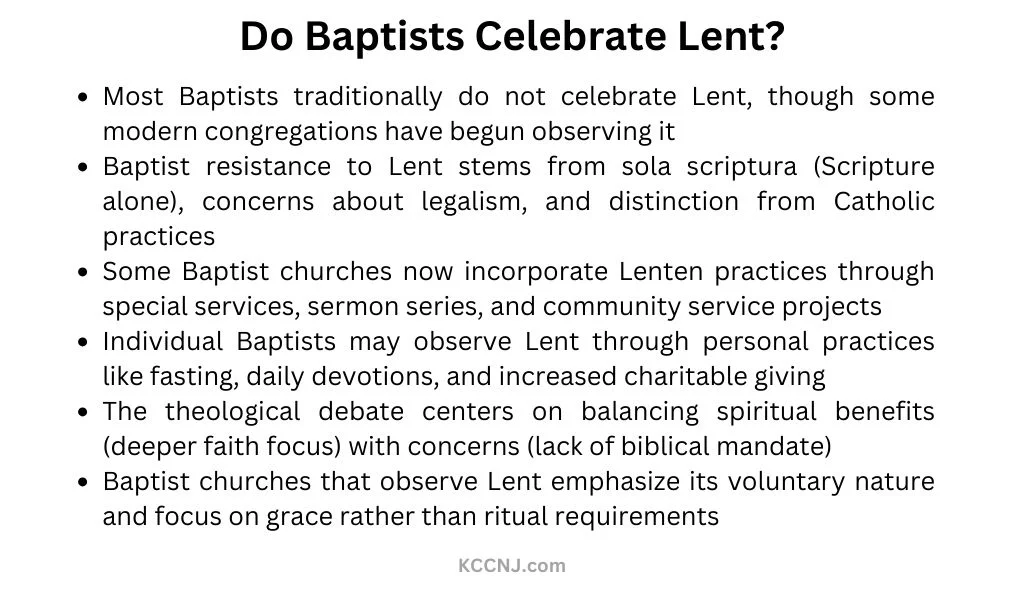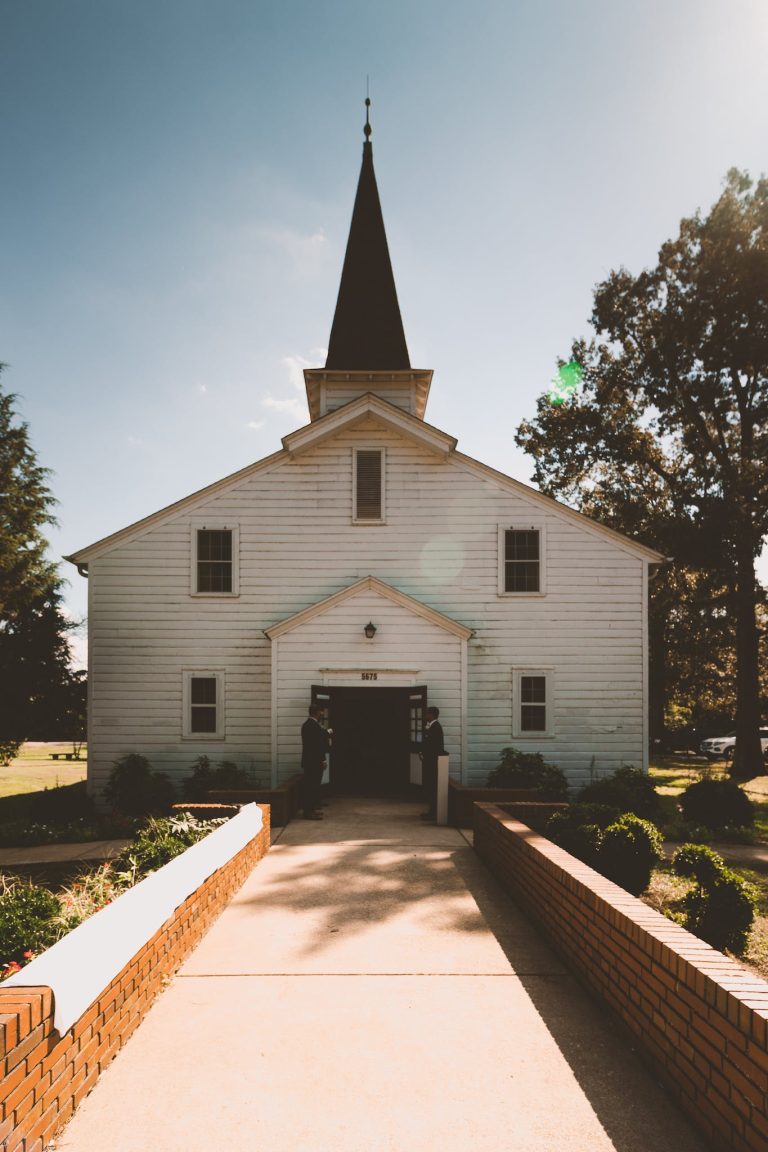Do Baptists Celebrate Lent? A Clear Guide
Most Baptists do not traditionally celebrate Lent. However, some Baptist churches and individuals have begun to observe Lent in recent years as a way to prepare spiritually for Easter, though practices vary widely among congregations.
Understanding Lent and Baptist Traditions
What is Lent?
Lent is a 40-day period (excluding Sundays) leading up to Easter in the Christian calendar. It begins on Ash Wednesday and ends on Holy Saturday, the day before Easter Sunday. During Lent, many Christians focus on spiritual disciplines like prayer, fasting, and giving to prepare their hearts for the celebration of Christ’s resurrection.
Baptist Views on Lent
Historically, most Baptist churches have not observed Lent. This stems from several factors:
- Emphasis on Scripture alone: Baptists generally follow the principle of sola scriptura, meaning they base their practices primarily on what is explicitly taught in the Bible. Since Lent is not mentioned in Scripture, many Baptists have viewed it as an unnecessary tradition.
- Concerns about legalism: Some Baptists worry that observing Lent could lead to a works-based view of salvation, rather than salvation by grace through faith alone.
- Desire to differentiate from Catholic practices: As a Protestant denomination, Baptists have often sought to distance themselves from practices associated with Roman Catholicism.
- Focus on individual liberty: Baptist theology emphasizes the priesthood of all believers and soul liberty, allowing individuals to make their own decisions about spiritual practices not explicitly commanded in Scripture.
Changing Attitudes Toward Lent
In recent years, some Baptist churches and individuals have begun to embrace Lenten observances. Reasons for this shift include:
- Recognizing the value of spiritual preparation: Many see Lent as a helpful time for focused reflection and spiritual growth leading up to Easter.
- Connecting with the broader Christian tradition: Some Baptists appreciate the connection to historical Christian practices shared by other denominations.
- Adapting Lent to Baptist theology: Churches that observe Lent often emphasize its voluntary nature and focus on grace rather than earning favor with God.
Baptist Approaches to Lent
Churches That Observe Lent
Some Baptist churches have incorporated Lenten practices into their worship and discipleship programs. These may include:
- Ash Wednesday services: Some churches hold special services to mark the beginning of Lent, though they may not include the imposition of ashes.
- Sermon series: Pastors may preach on themes related to repentance, spiritual growth, or the life of Christ during the Lenten season.
- Small group studies: Churches may offer Bible studies or devotional materials focused on Lenten themes.
- Service projects: Congregations might encourage members to engage in acts of service or giving during Lent.
Individual Practices
Even in churches that don’t formally observe Lent, some Baptist individuals choose to participate in Lenten disciplines:
- Fasting: Some Baptists fast from food, social media, or other activities during Lent as a way to focus on their relationship with God.
- Daily devotions: Many use Lent as a time to establish or deepen habits of prayer and Bible reading.
- Self-examination: The Lenten season can be a time for personal reflection and repentance.
- Charitable giving: Some Baptists choose to give more generously to their church or other causes during Lent.

Theological Considerations for Baptists and Lent
Potential Benefits
Proponents of Lenten observance among Baptists often point to several potential spiritual benefits:
- Deepened focus on Christ: Lent can help believers center their thoughts on Jesus’ life, death, and resurrection.
- Spiritual discipline: The practices associated with Lent can strengthen one’s faith and commitment to following Christ.
- Community: Observing Lent together can foster a sense of unity within a congregation.
- Historical connection: Participating in Lent can help Baptists feel more connected to the broader Christian tradition.
Theological Concerns
Critics of Lenten observance among Baptists often raise these theological objections:
- Lack of biblical mandate: Since Lent is not explicitly commanded in Scripture, some argue it shouldn’t be practiced.
- Risk of legalism: There’s concern that Lenten observances could lead to a focus on outward actions rather than heart change.
- Confusion about grace: Some worry that emphasizing Lenten sacrifices might undermine the doctrine of salvation by grace alone.
- Cultural accommodation: Critics may see the adoption of Lent as an unnecessary concession to broader cultural Christianity.
Practical Considerations for Baptist Churches
Introducing Lenten Practices
For Baptist churches considering incorporating Lenten observances, here are some practical steps:
- Education: Teach the congregation about the history and purpose of Lent, emphasizing its voluntary nature.
- Gradual introduction: Start with simple practices like a special prayer focus or Scripture reading plan.
- Emphasize grace: Make it clear that Lenten observances are not about earning God’s favor but growing in faith.
- Respect diversity: Allow for different levels of participation within the congregation.
Maintaining Baptist Distinctives
While observing Lent, Baptist churches can still maintain their theological distinctives:
- Emphasize individual choice: Make it clear that participation in Lenten practices is voluntary.
- Focus on Scripture: Base Lenten themes and practices on biblical teachings.
- Avoid ritualism: Keep practices simple and focused on personal spiritual growth rather than elaborate ceremonies.
- Maintain regular practices: Continue to emphasize year-round discipleship, not just during Lent.

FAQs About Baptists and Lent
Is it wrong for Baptists to observe Lent?
There’s no inherent conflict between Baptist theology and Lenten observance. The key is to approach Lent as a voluntary spiritual discipline rather than a required ritual.
How can Baptists observe Lent without compromising their beliefs?
Baptists can focus on biblical practices like prayer, fasting, and giving without adopting elements that might conflict with their theology, such as the imposition of ashes.
Do all Baptist churches reject Lent?
No, attitudes toward Lent vary among Baptist churches. While many don’t observe it, some have begun incorporating Lenten practices in recent years.
Can observing Lent enhance a Baptist’s spiritual life?
Many Baptists who observe Lent find it helpful for focusing on spiritual growth and preparing to celebrate Easter. However, it’s not necessary for spiritual development.
How does Baptist theology view fasting during Lent?
Baptist theology generally sees fasting as a voluntary spiritual discipline that can be practiced at any time, not just during Lent. The emphasis is on the heart attitude behind the fast rather than the act itself.







